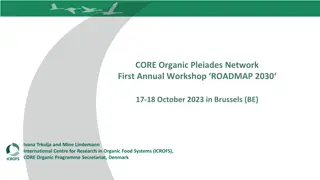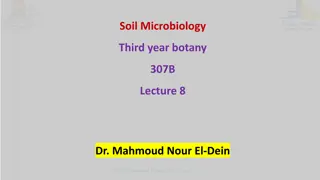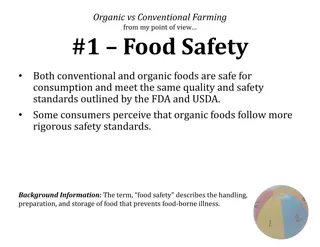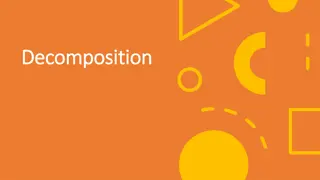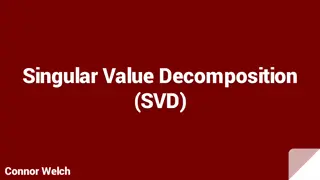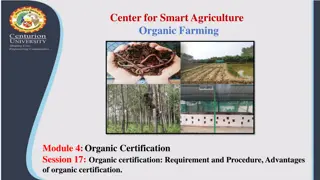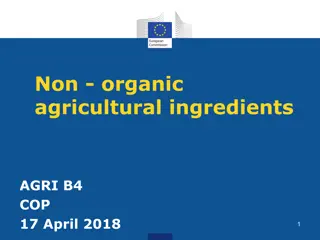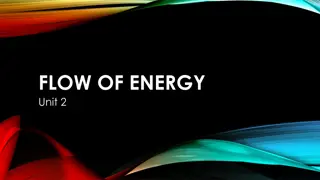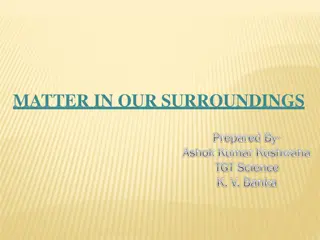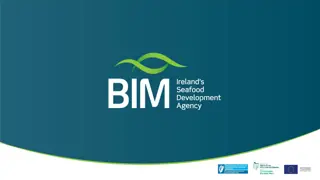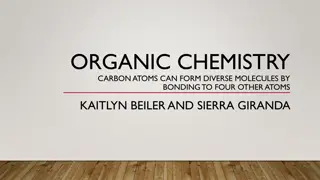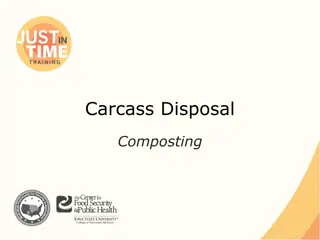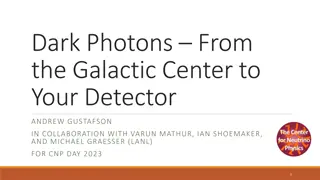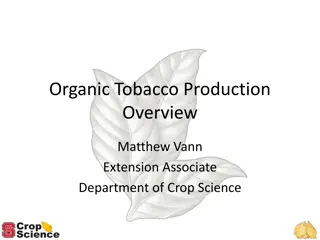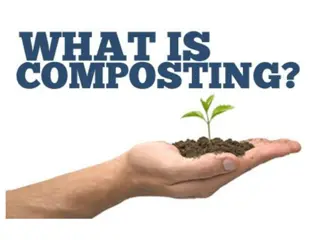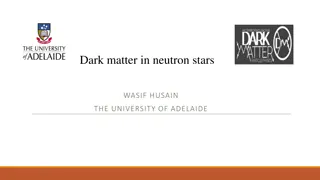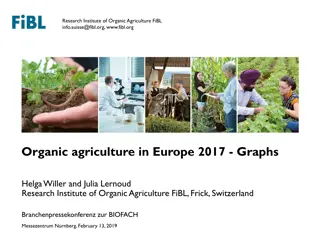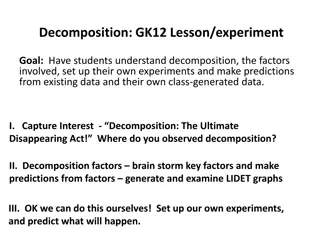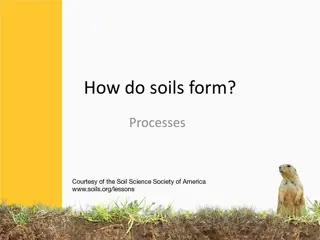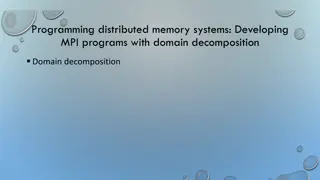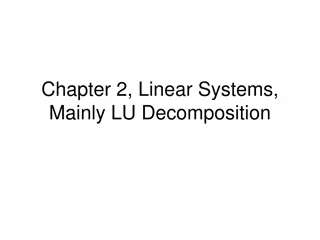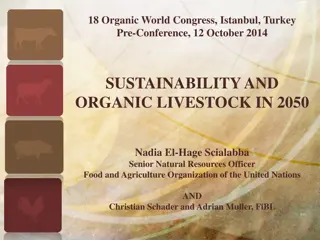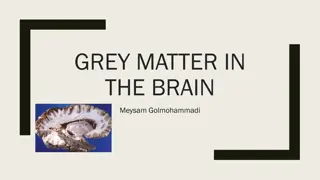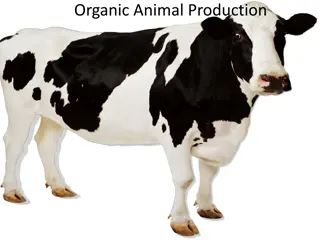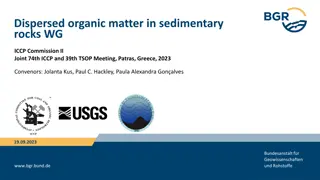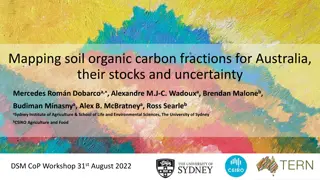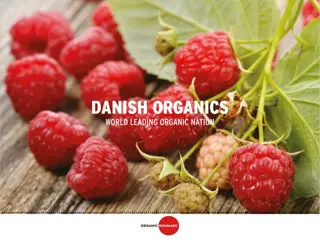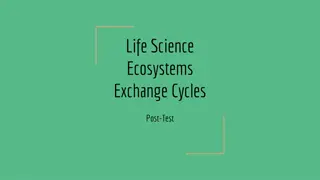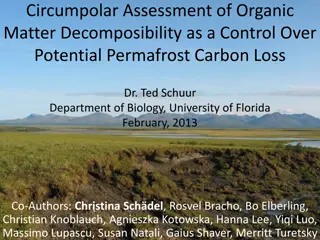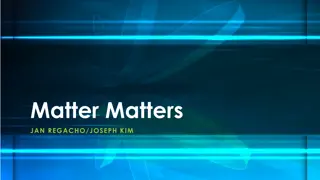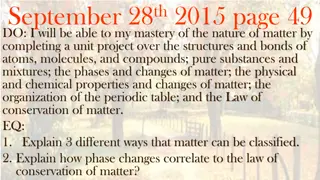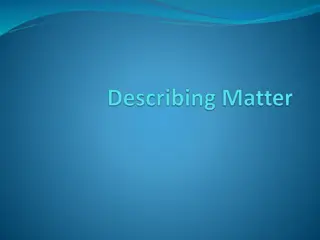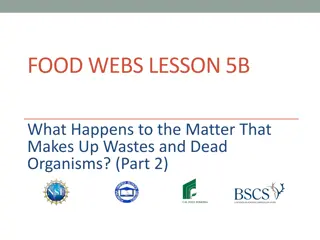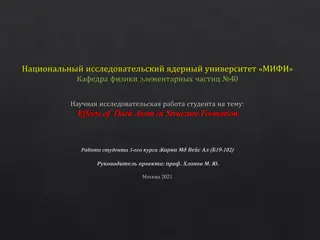CORE Organic Pleiades Network First Annual Workshop Roadmap 2030 - Event Recap
The CORE Organic Pleiades Network held its first annual workshop in Brussels, focusing on organic research and innovation in the European agri-food sector. The event discussed HEU partnerships, national/regional action plans, research funding, and more. CORE Organic aims to enhance knowledge and inn
0 views • 37 slides
Introduction to Chemistry: Matter, Energy, and Measurement
Chemistry is the study of matter, its properties, and the changes it undergoes. This content covers the basics of chemistry, including the classification of matter into pure substances and mixtures, different states of matter, and the building blocks of matter such as atoms and molecules. Sample exe
5 views • 51 slides
Understanding Composition of Soil Organic Matter in Soil Microbiology
Soil organic matter is vital for soil properties and plant nutrition. It consists of plant residues, animal remains, and microbial tissues, comprising complex compounds like carbohydrates, proteins, fats, and more. The composition varies with plant type, age, and nature. Leguminous plants are rich i
0 views • 19 slides
Organic vs Conventional Farming: An Overview
In the debate between organic and conventional farming, both methods have their pros and cons. While organic foods are perceived to follow stricter safety standards, both types meet FDA and USDA regulations. They offer similar nutritional value, but organic farming tends to have lower efficiency due
0 views • 6 slides
Understanding the Power of Decomposition in Problem Solving
Learn about the concept of decomposition and its importance in problem-solving scenarios in both real-life and Computer Science. Discover how breaking down complex problems into manageable sub-problems can lead to efficient solutions. Explore how decomposition aligns with algorithmic thinking and en
1 views • 11 slides
Parallel Implementation of Multivariate Empirical Mode Decomposition on GPU
Empirical Mode Decomposition (EMD) is a signal processing technique used for separating different oscillation modes in a time series signal. This paper explores the parallel implementation of Multivariate Empirical Mode Decomposition (MEMD) on GPU, discussing numerical steps, implementation details,
1 views • 15 slides
Understanding Singular Value Decomposition (SVD)
Singular Value Decomposition (SVD) is a powerful method for solving systems of linear equations or matrices that are singular or close to singular. When LU-decomposition or Gaussian elimination fail, SVD provides a stable matrix decomposition helpful in various applications. It is particularly usefu
0 views • 17 slides
Understanding Organic Certification and NPOP in India
Organic certification is crucial for ensuring the quality and authenticity of organic products. This involves adhering to strict production standards and undergoing periodic inspections. In India, the National Programme on Organic Production (NPOP) plays a significant role in certifying organic comm
0 views • 10 slides
Understanding the Singular Value Decomposition
The Singular Value Decomposition (SVD) is a powerful factorization method for matrices, extending the concept of eigenvectors and eigenvalues to non-symmetric matrices. This decomposition allows any matrix to be expressed as the product of three matrices: two orthogonal matrices and a diagonal matri
0 views • 35 slides
Concerns and Recommendations on Non-Organic Agricultural Ingredients
Various Member States express concerns about the inclusion of new non-organic agricultural ingredients in Regulation 889/2008 Annex IX, emphasizing the need to maintain the integrity of organic production. Suggestions include keeping the list as short as possible, searching for organic alternatives,
0 views • 19 slides
Understanding Photosynthesis and Cycling of Matter in Living Systems
Photosynthesis, the process by which plants convert sunlight into chemical energy, and the cycling of matter through carbon, nitrogen, and water cycles are crucial aspects of living systems. Chloroplasts and chlorophyll play key roles in photosynthesis, while the carbon cycle highlights the essentia
0 views • 20 slides
Understanding Matter in Our Surroundings
Matter in Our Surroundings discusses the classification of matter, physical nature of matter, and the properties of matter particles such as size, space between them, and continuous movement. It explains how matter is made up of particles and how they interact with each other through various activit
0 views • 27 slides
Bi-Decomposition of Large Boolean Functions Using Blocking Edge Graphs
Bi-decomposition is a vital technique in logic synthesis for restructuring Boolean networks. This paper discusses the methodology of breaking down large Boolean functions using Blocking Edge Graphs (BEG) to simplify physical design and reduce complexity. The process involves constructing BEG, perfor
1 views • 29 slides
Overview of Global Farmed Salmon and Organic Production
The data showcases the production figures for global farmed salmon across various countries, with Norway leading the production, followed by Chile, Scotland, and others. Additionally, insights into the growing organic salmon production, vulnerabilities in the sector, and details on organic mussels p
0 views • 9 slides
Understanding Organic Chemistry: Carbon Atoms and Molecular Diversity
In organic chemistry, carbon atoms can form diverse molecules by bonding to four other atoms, leading to molecular complexity and diversity. The versatile nature of carbon allows for the formation of various carbon skeletons, contributing to the vast array of organic compounds. Hydrocarbons, consist
0 views • 12 slides
Effective Carcass Disposal Through Composting
Composting carcasses with organic materials can accelerate biological decomposition, destroy pathogens, and produce a nutrient-rich humus. Proper carbon-to-nitrogen ratios, moisture levels, oxygen maintenance, and temperature control are crucial for the efficiency of the composting process. Mixing a
0 views • 21 slides
Unveiling Dark Matter Mysteries Through Dark Photons
Delve into the exploration of dark matter through the lens of dark photons in the galactic center and detectors. Uncover the enigmatic nature of dark matter, its interactions, existing constraints, and our model with fermionic dark matter and a dark photon mediator. Discover strategies to evade cons
0 views • 18 slides
Guide to Organic Tobacco Production Process
Understand the process of organic tobacco production including obtaining a contract, certifying land, inspections, maintaining certification, selling leaf, and transitioning from conventional to organic production. Get insights on organic certification through USDA-National Organic Program, required
0 views • 18 slides
Understanding the Fundamentals of Composting
Compost is organic matter decomposed into a valuable fertilizer and soil amendment. The process involves aerobic decomposition of waste material, turning it into nutrient-rich humus. Composting requires a mix of organic matter, water, air, and proper carbon:nitrogen ratio for efficient breakdown. Th
0 views • 21 slides
Exploring Dark Matter in Neutron Stars
Investigate the interaction of dark matter within neutron stars, comprising approximately 25% of the universe's total matter. The nature of dark matter assumptions, its distribution within neutron stars based on fermionic or bosonic properties, and the implications for self-interacting fermionic and
0 views • 22 slides
Overview of Organic Agriculture in Europe 2017
Europe has seen a significant increase in organic farmland and retail sales in 2017. With 2.9% of Europe's farmland being organic, totaling 14.6 million hectares, countries like Spain, Italy, and France lead in organic farming. In terms of retail sales, Denmark and Switzerland stand out with high pe
0 views • 9 slides
Understanding Decomposition: Experiments & Predictions for Students
Engage students in understanding decomposition through hands-on experiments, predictions based on factors, and analysis of data. Explore various decomposition examples, set up experiments with different variables, and analyze outcomes to enhance comprehension. Utilize resources like LIDET graphs and
0 views • 10 slides
Understanding Soil Formation Processes and Changes Over Time
Soil formation involves several processes such as additions, losses, translocations, and transformations. Additions like rainwater and organic matter, losses from evaporation and leaching, translocations by gravity and organisms, and transformations of components all contribute to the development an
0 views • 10 slides
Insights into U.S. Organic Industry Trends and Outlook
The U.S. organic industry is experiencing positive consumer demand growth, with organic food sales reaching $56 billion in 2020. Despite a decline in organic dairy sales, the overall organic acreage growth remains strong. The market faces challenges such as the impact of COVID-19, the need for produ
0 views • 12 slides
Developing MPI Programs with Domain Decomposition
Domain decomposition is a parallelization method used for developing MPI programs by partitioning the domain into portions and assigning them to different processes. Three common ways of partitioning are block, cyclic, and block-cyclic, each with its own communication requirements. Considerations fo
0 views • 19 slides
Understanding Linear Systems and LU Decomposition
Explore the fundamental concepts of linear algebra, including matrix notation, existence of solutions, vector spaces, computation tasks, and LU decomposition techniques. Learn about Gauss elimination, Crout's algorithm, and how to solve linear systems efficiently using LU decomposition.
0 views • 25 slides
Sustainability and Organic Livestock Modeling for Global Food Security
The research presented at the 18th Organic World Congress in Istanbul delves into the Sustainability and Organic Livestock (SOL-m) modeling approach developed by FAO and FiBL. The study aims to explore the potential impacts of global conversion to organic livestock production by 2050 on food securit
0 views • 25 slides
Procedural Decomposition and Static Methods in Programming
Understanding procedural decomposition and static methods is essential in programming to reduce redundancy, organize code effectively, and manage complexity. Procedural decomposition involves dividing a problem into methods, while static methods help in code reuse and managing complexity. By designi
0 views • 18 slides
Understanding Gray Matter in the Brain: Structure, Function, and Importance
Gray matter in the brain plays a crucial role in information processing and cognitive functions. Composed of neuronal cell bodies and unmyelinated axons, gray matter is visibly pinkish-gray and is essential for various brain functions. It forms a synaptically dense area with fewer cell bodies compar
0 views • 7 slides
Organic Animal Production in the US: Insights and Statistics
Organic animal production in the US involves raising livestock and poultry through natural practices without antibiotics or hormones. Animals are fed organic feed and have access to outdoor spaces to mimic natural behavior. Statistically, over 5 million acres of land are certified for organic animal
0 views • 19 slides
Dispersed Organic Matter in Sedimentary Rocks - Review Paper for Geological Application Studies in the 21st Century
The WG on Dispersed Organic Matter in Sedimentary Rocks is working on a review paper focusing on application studies of dispersed organic matter (DOM) within a geological context. The paper aims to provide an insightful overview titled "Applications of Dispersed Organic Matter Petrology in the 21st
0 views • 18 slides
Mapping Soil Organic Carbon Fractions in Australia: Stocks and Uncertainty
This study by Mercedes Román Dobarco et al. focuses on mapping soil organic carbon fractions across Australia, including mineral-associated organic carbon, particulate organic carbon, and pyrogenic organic carbon. The research involves prediction of soil organic carbon fractions using spectral libr
0 views • 17 slides
The Danish Model: Driving Organic Breakthrough & Market Growth
The Danish Model showcases the political and market mobilization behind the organic breakthrough in Denmark. Organic Denmark focuses on driving market growth through political policy, consumer motivation, innovation on farms, and strategic work with retailers and food services. The country has exper
0 views • 39 slides
Ecosystem Exchange Cycles in Life Science
Learn about the law of conservation of matter, harmful effects of fossil fuels, the role of the sun in photosynthesis, organic matter decomposition, and oxygen atoms in the photosynthesis reaction. Understand the crucial processes that sustain life on Earth.
0 views • 6 slides
Permafrost Carbon Research Network: Assessing Organic Matter Decomposibility for Climate Impact
This research network, led by Dr. Ted Schuur at the University of Florida, focuses on understanding the decomposition of organic matter in permafrost regions and its potential impact on climate change. Through data syntheses and active working groups, the network aims to quantify uncertainties and a
0 views • 18 slides
Understanding Matter: States, Properties, and Changes
Matter is anything with mass and volume, existing in solid, liquid, or gas states. The Kinetic Molecular Theory explains the behavior of particles in matter. Chemistry explores matter through chemical and physical changes. Different factors, like temperature, can change the state of matter. Physical
0 views • 6 slides
Exploring the Nature of Matter: Unit Project Overview
Embark on a journey to understand the structures and bonds of matter through a comprehensive unit project. Delve into atoms, molecules, compounds, pure substances, mixtures, phases of matter, properties, periodic table, and conservation laws. Explore matter classification and phase changes' relation
0 views • 9 slides
Introduction to Chemistry and Matter
Understanding chemistry involves studying the properties of matter and its changes. Matter is anything that occupies space and has mass, composed of vibrating atoms. It includes examples like air, water, books, desks, and people, while non-examples are light, sound, thoughts, and emotions. Physical
0 views • 18 slides
Understanding Decomposition in Food Webs Lesson 5B
Explore the process of decomposition in food webs through a series of investigations involving strawberries and their decomposition process. Uncover the role of mold in decomposition, the consistency of mass despite shrinkage, and the recycling of matter in ecosystems. Engage with questions on the d
0 views • 9 slides
Exploring Dark Atom Effects on Structure Formation in the Universe
Overwhelming evidence points towards the existence of dark matter in the universe, with various theoretical models such as OHe atoms and Glashow's EIMP model proposed to explain its nature. Dark OHe atoms, consisting of 2 charged particles bound with primordial He nuclei, offer a unique perspective
1 views • 8 slides
